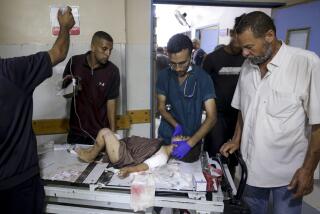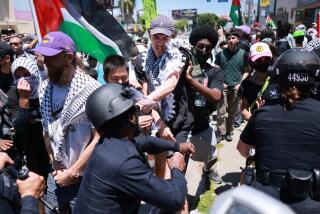Celebration turns to chaos in Egypt
- Share via
Reporting from Cairo — Within minutes, the buoyant mood inside Tahrir Square turned into a fight for survival — and for Egypt’s future.
Like two medieval armies, screaming, enraged mobs — both hoisting Egyptian flags and professing love of country — clashed violently Wednesday with rocks, sticks and Molotov cocktails. Soldiers stood by passively as the pitched battle between supporters of President Hosni Mubarak and those seeking his immediate ouster threatened one of the nation’s most treasured sites, the Egyptian Museum.
The periphery of the square took on the look of a city of zombies as stunned anti-government demonstrators poured out of the plaza with bandaged, blood-smeared faces.
One man, walking alone, had thick white gauze wrapped around his head and chin. He slumped his shoulders and spoke in a hollow voice.
“I couldn’t run away,” said the man, who wouldn’t give his name. “I acknowledged their right to say yes to Mubarak. They should acknowledge ours.”
Three deaths were reported at the square and hundreds of people were injured, government officials said. Gunfire occasionally crackled and it appeared that the military was exploding sound grenades in an attempt to disperse the combatants.
As the front line moved up and down the promenade and each side advanced and retreated, one or two fighters would invariably fall behind and be caught by the other side. When anti-government protesters captured one such Mubarak supporter, they dragged him off to a side road and pummeled him. A woman beat him with a two-by-four. Finally, other anti-government protesters stepped in and dragged him to the military to protect him.
In the heat of the rock-throwing volleys, one anti-Mubarak protester stood atop an overturned container, just behind the front line, waving an Egyptian flag and refusing to stop even as stones rained down on him.
By dusk, pro-Mubarak protesters had positioned themselves on rooftops of office and residential buildings, hurling rocks and Molotov cocktails on their rivals below. Not long after, anti-government protesters occupied their own rooftops, and hurled their own firebombs.
Shortly before midnight, anti-Mubarak protesters had gained the momentum, circling around alleyways to attack the pro-presidential forces from the right. They dug up steel fence posts and other pieces of metal, which they used as shields against rocks and fire.
Then they pounded on the metal in unison in a threatening din as they drove their foes toward the edge of the square. At one point, they appeared to be singing, their voices reverberating through the streets, punctuated by the sound of gunfire.
The day had begun peacefully enough, with the first mass rally of Mubarak supporters taking place in the posh shopping district of Mohandeseen.
Many who gathered there said they were saddened by Mubarak’s announcement Tuesday night that he would relinquish power in the fall after three decades at the helm. Calling for a return to stability, some expressed fear that an immediate resignation by Mubarak would throw Egypt into chaos. They said they were tired of the government-imposed curfew, the closure of banks and other businesses, and of having to protect their homes with the help of vigilante squads since police walked off the job Saturday.
“No one can run this country like Mubarak,” said Hossem Foda, 34, a Cairo taxi driver. “It’s like Saddam in Iraq. When Saddam was gone, no one else could run the country. We don’t want our country destroyed.”
At first the crowd’s mood was festive, though tense. People waved flags, kissed photos of Mubarak and paraded down the street on camels costumed like those usually seen at the Giza pyramids. Many said it was probably one of the largest pro-Mubarak rallies ever held.
At some point, however, the professed desire for a return to normality gave way to anger, taunts and violence.
Some of the Mubarak loyalists marched toward Tahrir Square, crossing the Nile and gaining numbers along the way.
Those on camel and horseback were among the first to arrive. The sight of the camels took many anti-Mubarak protesters aback. When the riders turned whips and sticks on pedestrians, panic swept the square. A few riders were pulled off their animals and beaten, television footage showed.
Soon afterward, thousands more pro-Mubarak demonstrators approached the square, walking without interruption through military checkpoints.
Inside the plaza, protesters who had been camped out for days seemed to sense the coming danger. Men linked arms and formed double human chains at main entry points. As the leading edge of the pro-Mubarak force approached, shouting matches broke out and punches were thrown.
By the famous Groppi Cafe, at least a thousand pro-Mubarak demonstrators charged toward the square, tossing rocks and then retreating toward a handful of candy and pistachio shops that remained opened.
Another group of Mubarak supporters chased foreign journalists, striking them with sticks and fists.
By 3 p.m., the two sides were facing off along a promenade next to the vaunted museum, hurling rocks and pieces of dug-up pavement.
It resembled an old-fashioned turf war. First the pro-Mubarak supporters, screaming in unison, rushed forward, forcing their foes back with an avalanche of rocks. Then the anti-Mubarak crowd picked up the same rocks and hurled them, forcing the Mubarak supporters to retreat.
Throughout the fighting, the small military contingent stationed at the square stood by watching. Tanks positioned 100 yards from the fighting did not move. Even checkpoints into the area, which were staffed by soldiers, were left open, allowing hundreds more pro-Mubarak supporters to flood into the already volatile plaza.
At one point, the mobs moved within a few yards of each other, engaging in a brief brawl.
Finally the military positioned large green trucks in the middle of the road to create a buffer zone between the two sides. But two hours later, those trucks had been destroyed by rocks and fire, ignited by the pro-Mubarak force’s Molotov cocktails.
“We’re not leaving,” Omar Adli, a bearded anti-Mubarak protester, said before running off to exchange punches with a pro-Mubarak foe. “We’ll sit under the tanks if the army tries to stop us.”
Times staff writers Timothy M. Phelps and Michael Robinson Chavez contributed to this report.
More to Read
Sign up for Essential California
The most important California stories and recommendations in your inbox every morning.
You may occasionally receive promotional content from the Los Angeles Times.










